介词 时间用法
in、on、at关于时间用法
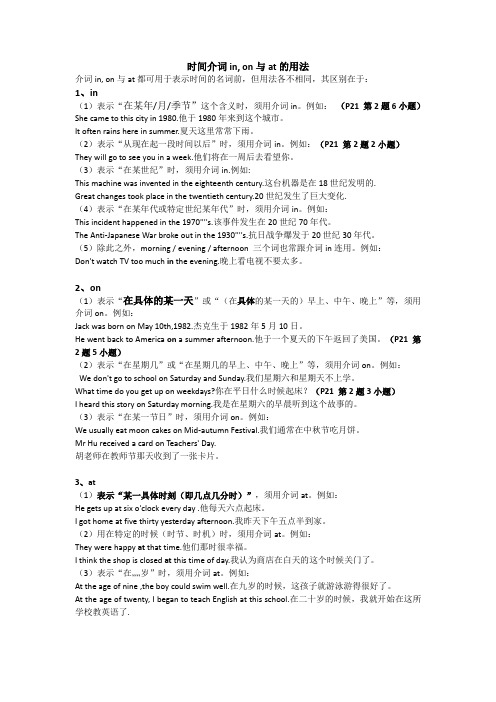
时间介词in, on与at的用法介词in, on与at都可用于表示时间的名词前,但用法各不相同,其区别在于:1、in(1)表示“在某年/月/季节”这个含义时,须用介词in。
例如:(P21 第2题6小题)She came to this city in 1980.他于1980年来到这个城市。
It often rains here in summer.夏天这里常常下雨。
(2)表示“从现在起一段时间以后”时,须用介词in。
例如:(P21 第2题2小题)They will go to see you in a week.他们将在一周后去看望你。
(3)表示“在某世纪”时,须用介词in.例如:This machine was invented in the eighteenth century.这台机器是在18世纪发明的.Great changes took place in the twentieth century.20世纪发生了巨大变化.(4)表示“在某年代或特定世纪某年代”时,须用介词in。
例如:This incident happened in the 1970''''s.该事件发生在20世纪70年代。
The Anti-Japanese War broke out in the 1930''''s.抗日战争爆发于20世纪30年代。
(5)除此之外,morning / evening / afternoon 三个词也常跟介词in连用。
例如:Don't watch TV too much in the evening.晚上看电视不要太多。
2、on(1)表示“在具体的某一天”或“(在具体的某一天的)早上、中午、晚上”等,须用介词on。
例如:Jack was born on May 10th,1982.杰克生于1982年5月10日。
He went back to America on a summer afternoon.他于一个夏天的下午返回了美国。
初中英语介词in-on-at-的时间用法

初中英语in,on,at的时间用法规律如下:in the morning/afternoon/evening在早晨/下午/傍晚,at noon/night在中午/夜晚,on weekdays/weekends在工作日/周末,on school days/nights在上学日/上学的当天晚上,early in the morning=in the early morning在大清早,late at night在深夜this, that, last, next, every, one, yesterday, today, tomorrow, tonight,all,most等词之前一般不加介词。
如,this morning 今天早晨(on)that day在那天(that day更常用些)last week上周next year明年the next month第二个月(以过去为起点的第二个月,next month以现在为起点的下个月)every day每天one morning一天早晨yesterday afternoon昨天下午tomorrow morning明天早晨all day/morning/night整天/整个早晨/整晚(等于the wholeday/morning/night)most of the time (在)大多数时间除了前两点特殊用法之外,其他≤一天,用on,>一天用in,在具体时刻或在某时用at(不强调时间范围)关于onon my ninth birthday在我九岁生日那天on Teachers’Da y在教师节(注意:节日里有表人的词汇一般都用复数在加s’所有格,如on Children’s Day, on Women’s Day, 有四个节日强调单数之意思,on Mother’s Day, on Father’s Day, on April Fool’s Day, on Valentine’s Day)on Sunday在周日,on Sunday morning在周日早晨on June 2nd在六月二日on the second (of June 2nd) 在六月的第二天即在六月二日on the morning of June 2nd在六月二日的早晨,on a rainy morning在一个多雨的早晨注意:on Sunday在周日,on Sundays每逢周日(用复数表每逢之意),everySunday每个周日,基本一个意思。
介词用法总结

介词用法总结介词是连接词与词之间关系的一类虚词,它在句子中起到链接作用,并且具有一定的语法功能。
正确地使用介词可以使句子更加准确、清晰。
在英语中,有许多常用的介词,本文将对其中的一些常见介词及其用法进行总结。
一、介词用于表示地点和位置1. in:表示在某个范围或地点之内Examples:- The book is in the bag.- She lives in New York.2. at:表示在某个具体的地点Examples:- We met at the park.- He works at the office.3. on:表示在某个表面或者位置上Examples:- The cat is sitting on the chair.- The picture is on the wall.二、介词用于表示时间1. on:表示某一天或日期Examples:- I have a meeting on Monday.- We will celebrate New Year's Day on January 1st.2. at:表示具体的时刻Examples:- The train will arrive at 8 o'clock.- Let's meet at noon.3. in:表示较长的时间段Examples:- She will go on vacation in the summer.- We usually have a family dinner in the evening.三、介词用于表示原因和目的1. for:表示目的Examples:- I bought a new dress for the party.- He is studying hard for the exam.2. because of:表示因果关系- The match was canceled because of the rain.- She couldn't come to the party because of her illness.四、介词用于表示方式和手段1. by:表示通过某种方式或手段Examples:- I go to work by bus.- The letter was sent by email.2. with:表示使用某物或与某人一起Examples:- She wrote the letter with a pen.- He went to the park with his friends.五、介词用于表示关系和比较1. of:表示某物的一部分、属于或由...组成Examples:- The first chapter of the book is interesting.- The house is made of bricks.2. to:表示所属关系或比较- The tail belongs to the dog.- He is taller than his brother.六、其他常用介词1. with:表示同伴或陪伴关系Examples:- I went to the movies with my friends.- She enjoys traveling with her family.2. without:表示没有某种情况或物品Examples:- I can't live without music.- He ate lunch without a fork.总结:介词在英语中起到非常重要的作用,它可以连接词与词之间的关系,使句子更加准确和流畅。
全面、清晰的in、on、at的时间用法和地点用法
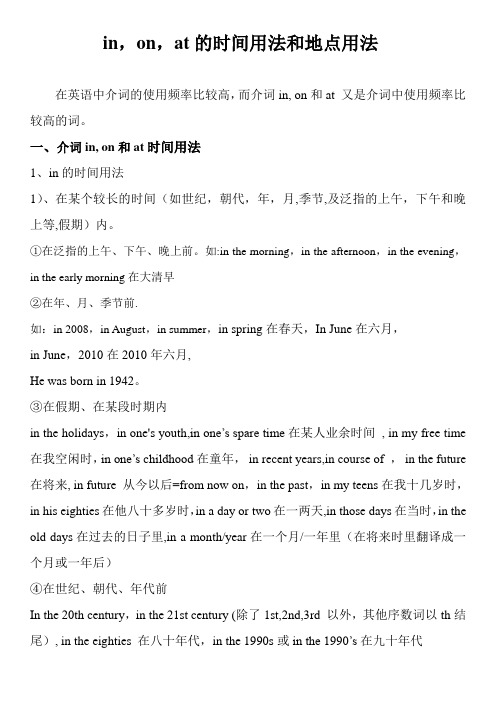
in,on,at的时间用法和地点用法在英语中介词的使用频率比较高,而介词in, on和at 又是介词中使用频率比较高的词。
一、介词in, on和at时间用法1、in的时间用法1)、在某个较长的时间(如世纪,朝代,年,月,季节,及泛指的上午,下午和晚上等,假期)内。
①在泛指的上午、下午、晚上前。
如:in the morning,in the afternoon,in the evening,in the early morning在大清早②在年、月、季节前.如:in 2008,in August,in summer,in spring在春天,In June在六月,in June,2010在2010年六月,He was born in 1942。
③在假期、在某段时期内in the holidays,in one's youth,in one’s spare time在某人业余时间, in my free time 在我空闲时,in one’s childhood在童年,in recent years,in course of ,in the future 在将来, in future 从今以后=from now on,in the past,in my teens在我十几岁时,in his eighties在他八十多岁时,in a day or two在一两天,in those days在当时,in the old days在过去的日子里,in a month/year在一个月/一年里(在将来时里翻译成一个月或一年后)④在世纪、朝代、年代前In the 20th century,in the 21st century (除了1st,2nd,3rd 以外,其他序数词以th结尾), in the eighties 在八十年代,in the 1990s或in the 1990’s在九十年代2)、在一段时间in a month/year在一个月/年里(在将来时里翻译成一个月/年之后)in the day(time)在白天,可换成duringin my childhood在我的童年里in my free/leisure time在我空闲时,in可换成during,也可以写成at leisure在空闲时。
介词+时间用法
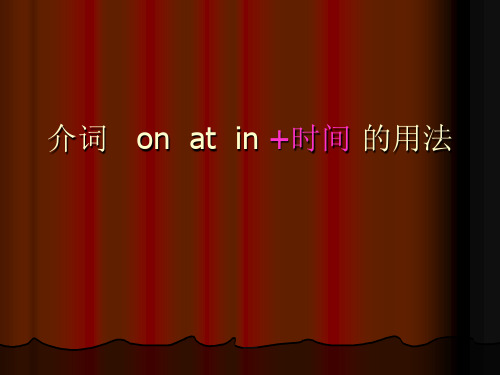
At 几点钟;In 一段时间;On 某一天
at seven o’clock. 1. I go to school _____
on Sunday afternoon. 2. I usually play badminton ______
in 3. The building’s shadow is long ______ the afternoon. at noon. 4. The sun is high in the sky _____ at 11:35 at school every day. 5. We have lunch _____ On Monday, I have six classes. 6. ______
In 时间范围大(一段时间)
1.in 2.in 3.in 4.in 5.in 1> 2> 3 spring/ summer/ autumn/ winter May the morning /afternoon/ evening September/ May/ June/ July a year in a week in +四季 in +月份 in +年 / 年,月 / 月
介词 on at in +时间 的用法
at 时间最短,一般表示点时间,具
体的某个时刻
1.at six o’clock 2.at 8:30 习惯用语:at nightFra bibliotekat noon
On ‘在具体某一天’ 包括
‘具体某一天的上午 下午 和晚上’
1.On Mother’s Day ,I give carnations to my mother. 2.On Monday/Friday/Saturday…… 3.On Tuesday afternoon On Sunday morning (evening) 4.On July 1,1999 On March 7 <1>On + 星期(1----7) <2>On + 年,月,日 / 年,日 / 月,日
介词的用法

介词的用法
1)具体时间前介词用at。
.He gets up at half past seven every day.他每天七点半起床。
She goes to bed at eleveno’clock.她十一点睡觉。
2)表示“在早上,在下午,在晚上”的短语中用介词in,且定冠词the不能省略;表示“在中午,在夜里”的短语中介词用at,不加冠词。
in the morning在早上,in the afternoon在下午,in the evening在晚上
at noon在中午,atnight在夜里
3)表示“在某天”、“在某天的上午、下午等”的短语用介词on。
What do you usually do on Monday morning?星期一上午你通常做什么?
Do you sometimes go out to ea ton Friday evening?有时你星期五晚上出去吃饭吗?
He watches DVDs on Saturday night.星期六晚上他看DVD。
Parents take children to parks on June 1.六月一日,家长们带着孩子去公园。
4)在this,last,next,every等词前面既不加介词,也不用冠词。
What are you doing this afternoon?今天下午你做什么?
He visits his grandma every Friday.他每个星期五都去看望祖母。
She is going to Shanghai next Monday.她下个星期一去上海。
介词用法总结

介词用法总结介词是英语语法中一个重要的词类,用于表示名词、代词、动词和形容词等与其他词或短语之间的关系。
在不同的句子和语境中,介词具有不同的用法。
本文将对介词的用法进行总结,并提供相关的例句。
一、表示位置关系的介词1. in:在…之中,在(具体范围)。
例句:He is waiting in the car.(他正在车里等待。
)2. on:在…之上,在(水平面)。
例句:The book is on the table.(书在桌子上。
)3. at:在…地方,在(具体点)。
例句:She is studying at the library.(她在图书馆学习。
)4. by:在…旁边,靠近(某物)。
例句:He is standing by the door.(他站在门旁边。
)5. under:在…下面,在(某物)的底部。
例句:The cat is hiding under the bed.(猫在床下躲藏。
)6. between:在…之间(两者之间)。
例句:The restaurant is located between the bank and the supermarket.(这家餐厅位于银行和超市之间。
)二、表示时间关系的介词1. at:在(具体时间点)。
例句:She will meet her friend at 8 o'clock.(她将在8点钟见她的朋友。
)2. on:在(具体日期或星期)。
例句:I have a meeting on Monday.(星期一我有个会议。
)3. in:在(一段时间内)。
例句:He will travel to Europe in summer.(他将在夏天去欧洲旅行。
)4. during:在…期间,表示全程。
例句:I read a book during the flight.(我在飞行途中读了一本书。
)5. for:持续时间,表示时间段。
例句:They have been married for ten years.(他们已经结婚十年了。
英语介词中时间介词的用法

英语介词中时间介词的用法
英语介词一直是让学生很头疼的一个语法点,中文说道“在某某时间”时只用一个介词“在”就可以了,而英文会有at、on、in等等不同介词,下面是一个英文时间介词的大致使用规律分类。
早、午、晚要用in 例:in the morning 在早上
in the afternoon 在下午
in the evening 在晚上
in the day 在白天
at黎明、午、夜
例: at dawn, at daybreak 在黎明时候
at noon 在中午
at night 在夜间
at midnight 在午夜
在具体的点时间和周末,也用in
at six o'clock 在6点钟
at ten thirty a.m. 在上午10点30分
seven to five 5点差7分(半小时以上)
at the weekend 在周末
年、月、年月、季节、周
即在“来年”,在“某月”,在“某年某月” (但在某年某月某日则用on),在四季,在第几周等都要用in。
in December 1986 1986年12月
in July l983 1983年7月
in spring 在春季
in the third week 在第三周
在周几前用on
on Monday
on Sunday
周几和早、中、晚连用是是遵循“就近原则”(就是以第一个词为主)用on on Monday morning
on Sunday evening。
小学英语时间介词的用法

小学英语之---时间与介词一.英语中时刻表示方法时刻的表示方法通常将一小时以中间30分钟为分界点,具体用法为:1.30分钟以前表示方法(含30分钟)(1) 小时与分都直接翻译成数字。
如:①7:10 →seven ten②19:25 →nineteen twenty-five③8:30 →eight thirty(2)分钟的数字+past+小时的数字。
★★注:这里的past是介词,超过的意思,意思是某小时超过多少分钟。
①7:10 →seven ten = ten past seven (也就是七点超过十分钟)②19:25 →nineteen twenty-five = twenty-five past nineteen (也就是十九点超过二十五分钟)③8:30 →eight thirty = thirty past eight (也就是八点超过三十分钟)2. 30分钟以后表示方法(1) 小时与分都直接翻译成数字。
如:①9:43 →nine forty-three②15:51 →fifteen fifty-one③10:45 →ten forty-five(2)用60减去分钟的数字+to+下一小时。
★★注:这里的to是介词,差距的意思,意思是离下一个整点差多少分钟。
①9:43 →nine forty-three = (60-43) to ten 也就是seventeen to ten②15:51 →fifteen fifty-one = (60-51) to sixteen 也就是nine to sixteen③10:45 →ten forty-five =(60-45) to eleven 也就是fifteen to eleven3.特殊情况:15分钟还可以表示为a quarter (一刻钟),30分钟还可以表示为half (半小时)①9:15 →nine fifteen = fifteen past nine = a quarter past nine②8:30 →eight thirty = thirty past eight= half past③9:45 →nine forty-five = fifteen to eleven = a quarter to eleven二.英语时间、日期与节日前的介词英语时间、日期与节日前的介词通常有三个:at、in、on等。
介词in on at在表示时间时的用法区别
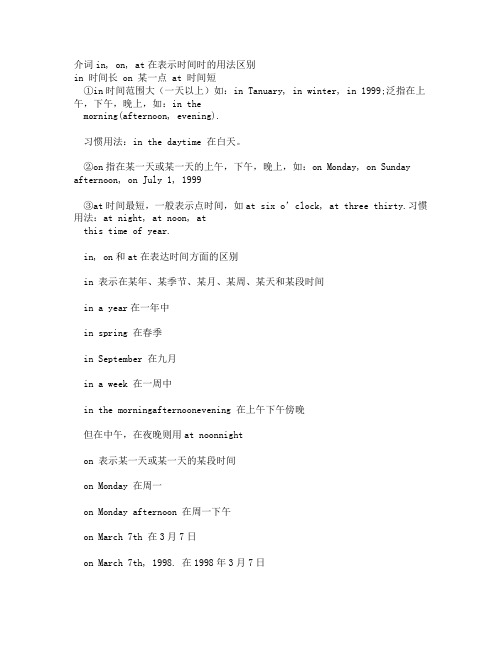
介词in, on, at在表示时间时的用法区别in 时间长 on 某一点 at 时间短①in时间范围大(一天以上)如:in Tanuary, in winter, in 1999;泛指在上午,下午,晚上,如:in themorning(afternoon, evening).习惯用法:in the daytime 在白天。
②on指在某一天或某一天的上午,下午,晚上,如:on Monday, on Sunday afternoon, on July 1, 1999③at时间最短,一般表示点时间,如at six o’clock, at three thirty.习惯用法:at night, at noon, atthis time of year.in, on和at在表达时间方面的区别in 表示在某年、某季节、某月、某周、某天和某段时间in a year在一年中in spring 在春季in September 在九月in a week 在一周中in the morningafternoonevening 在上午下午傍晚但在中午,在夜晚则用at noonnighton 表示某一天或某一天的某段时间on Monday 在周一on Monday afternoon 在周一下午on March 7th 在3月7日on March 7th, 1998. 在1998年3月7日on the morning of March 7th, 1998. 在1998年3月7日上午at 表示某个具体时刻。
at eight o’clock 在8点钟at this time of the year 在一年中的这个时候at the moment 在那一时刻at that time 在那时注意:在英语中,如果时间名词前用this, last, next 等修饰时,像这样的表示,“在某时”的时间短语前,并不需要任何介词。
例如:last month, last week, this year, this week, next year, the next day, thenext year等。
4 英语介词in-on-at-的时间用法
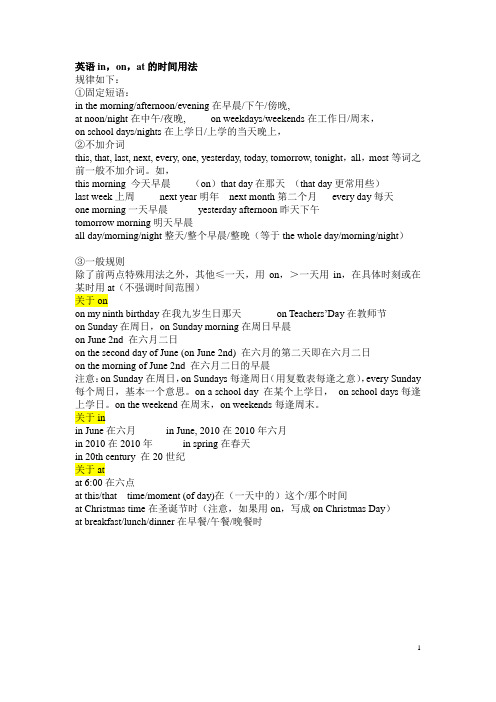
英语in,on,at的时间用法规律如下:①固定短语:in the morning/afternoon/evening在早晨/下午/傍晚,at noon/night在中午/夜晚, on weekdays/weekends在工作日/周末,on school days/nights在上学日/上学的当天晚上,②不加介词this, that, last, next, every, one, yesterday, today, tomorrow, tonight,all,most等词之前一般不加介词。
如,this morning 今天早晨(on)that day在那天(that day更常用些)last week上周next year明年next month第二个月every day每天one morning一天早晨yesterday afternoon昨天下午tomorrow morning明天早晨all day/morning/night整天/整个早晨/整晚(等于the whole day/morning/night)③一般规则除了前两点特殊用法之外,其他≤一天,用on,>一天用in,在具体时刻或在某时用at(不强调时间范围)关于onon my ninth birthday在我九岁生日那天on Teachers’Day在教师节on Sunday在周日,on Sunday morning在周日早晨on June 2nd 在六月二日on the second day of June (on June 2nd) 在六月的第二天即在六月二日on the morning of June 2nd 在六月二日的早晨注意:on Sunday在周日,on Sundays每逢周日(用复数表每逢之意),every Sunday 每个周日,基本一个意思。
on a school day 在某个上学日,on school days每逢上学日。
介词的用法

介词的用法1. at的用法(1). 用于时刻前。
如:at noon 中午,at night 夜晚,at sunrise 日出时(2). 用于钟点前。
如:at one o’clock 一点,at a quarter past two 两点一刻(3). 用语固定搭配中。
如:at Christmas 圣诞节,at New Year 元旦2. in的用法(1). 用于某个较长的时间。
如:世纪,年,季节,月份等。
In the twenty-first century 在21世纪,at one’s thirties 在某人30多岁时,in 2008 在2008年,in autumn 在秋天,in March 在三月(2). 用于泛指一天的上午,下午,晚上等。
如:in the morning / afternoon / evening(3). 用于表示“从现在起,多长时间后或多久以后”的短语。
如:They will finish thework in an hour. 一小时之后他们将完成这项工作。
3. on的用法(1). 用于星期、日期(包括该天的各部分),如:on Sundays / weekdays,on Saturdaymorning / afternoon / evening(2). 用于morning,afternoon,evening,night,day前,指具体的某天,或当上述名词前有描绘性修饰语时,如:on September 1st,on a cold morning,on the night of October 1st,on the first day,on his birthday,on Sunday morning(3). 用于公共节假日前,如:on T eachers’ Day,on Christmas Day,on National Day [注意]:at,on都可用来表示节假日,但at侧重指“休假的时节”,而不是指具体的哪一天;on 侧重指具体的时日,与它相连用的短语中多含“ Day”。
英语介词的用法(全)
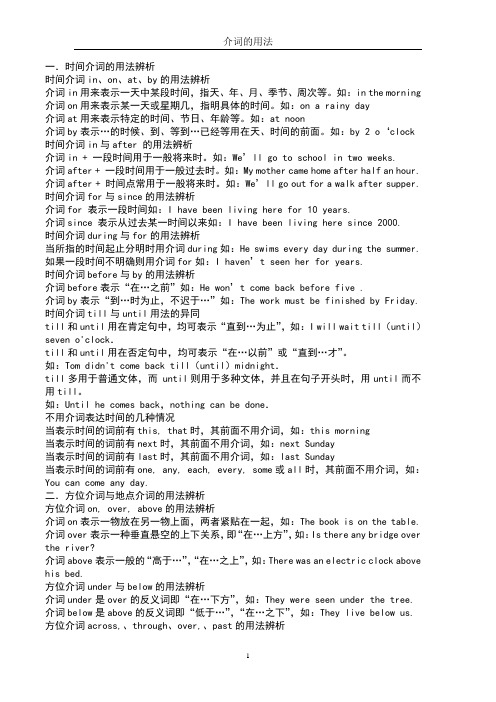
一.时间介词的用法辨析时间介词in、on、at、by的用法辨析介词in用来表示一天中某段时间,指天、年、月、季节、周次等。
如:in the morning 介词on用来表示某一天或星期几,指明具体的时间。
如:on a rainy day介词at用来表示特定的时间、节日、年龄等。
如:at noon介词by表示…的时候、到、等到…已经等用在天、时间的前面。
如:by 2 o‘clock 时间介词in与after 的用法辨析介词in + 一段时间用于一般将来时。
如:We’ll go to school in two weeks.介词after + 一段时间用于一般过去时。
如:My mother came home after half an hour. 介词after + 时间点常用于一般将来时。
如:We’ll go out for a walk after supper. 时间介词for与since的用法辨析介词for 表示一段时间如:I have been living here for 10 years.介词since 表示从过去某一时间以来如:I have been living here since 2000.时间介词during与for的用法辨析当所指的时间起止分明时用介词during如:He swims every day during the summer. 如果一段时间不明确则用介词for如:I haven’t seen her for years.时间介词before与by的用法辨析介词before表示“在…之前”如:He won’t come back before five .介词by表示“到…时为止,不迟于…”如:The work must be finished by Friday. 时间介词till与until用法的异同till和until用在肯定句中,均可表示“直到…为止”,如:I will wait till(until)seven o'clock.till和until用在否定句中,均可表示“在…以前”或“直到…才”。
表示时间的介词
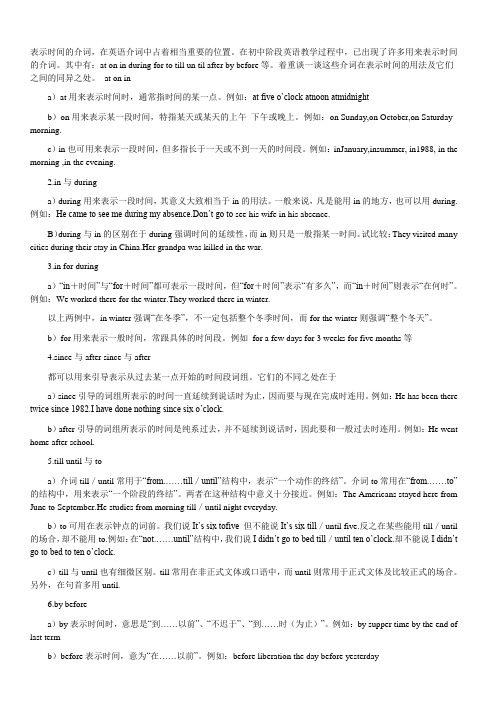
表示时间的介词,在英语介词中占着相当重要的位置。
在初中阶段英语教学过程中,已出现了许多用来表示时间的介词。
其中有:at on in during for to till un til after by before等。
着重谈一谈这些介词在表示时间的用法及它们之间的同异之处。
at on ina)at用来表示时间时,通常指时间的某一点。
例如:at five o’clock atnoon atmidnightb)on用来表示某一段时间,特指某天或某天的上午下午或晚上。
例如:on Sunday,on October,on Saturday morning.c)in也可用来表示一段时间,但多指长于一天或不到一天的时间段。
例如:inJanuary,insummer, in1988, in the morning ,in the evening.2.in与duringa)during用来表示一段时间,其意义大致相当于in的用法。
一般来说,凡是能用in的地方,也可以用during.例如:He came to see me during my absence.Don’t go to see his wife in his absence.B)during与in的区别在于during强调时间的延续性,而in则只是一般指某一时间。
试比较:They visited many cities during their stay in China.Her grandpa was killed in the war.3.in for duringa)“in+时间”与“for+时间”都可表示一段时间,但“for+时间”表示“有多久”,而“in+时间”则表示“在何时”。
例如:We worked there for the winter.They worked there in winter.以上两例中,in winter强调“在冬季”,不一定包括整个冬季时间,而for the winter则强调“整个冬天”。
介词时间用法
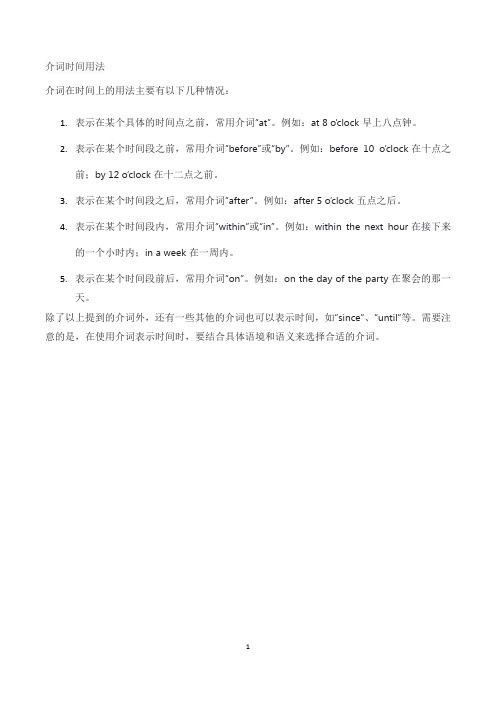
介词时间用法
介词在时间上的用法主要有以下几种情况:
1.表示在某个具体的时间点之前,常用介词“at”。
例如:at 8 o’clock早上八点钟。
2.表示在某个时间段之前,常用介词“before”或“by”。
例如:before 10 o’clock在十点之
前;by 12 o’clock在十二点之前。
3.表示在某个时间段之后,常用介词“after”。
例如:after 5 o’clock五点之后。
4.表示在某个时间段内,常用介词“within”或“in”。
例如:within the next hour在接下来
的一个小时内;in a week在一周内。
5.表示在某个时间段前后,常用介词“on”。
例如:on the day of the party在聚会的那一
天。
除了以上提到的介词外,还有一些其他的介词也可以表示时间,如“since”、“until”等。
需要注意的是,在使用介词表示时间时,要结合具体语境和语义来选择合适的介词。
1。
语法重点解析介词的常见用法

语法重点解析介词的常见用法介词是英语语法中的重要部分,用于连接名词、代词、动词等成分,起到关系和修饰的作用。
本文将对介词的常见用法进行重点解析。
一、表示地点方向的介词1. in:表示在某个范围或限定的区域内。
例如:- There is a book on the table.(桌子上有一本书。
)- I live in China.(我住在中国。
)2. on:表示在平面或表面之上。
例如:- The cat is sitting on the chair.(猫坐在椅子上。
)- Please put the pen on the desk.(请把笔放在桌子上。
)3. at:表示在某个特定的位置或地点。
例如:- I will meet you at the airport.(我会在机场和你见面。
)- He is waiting for you at the bus stop.(他在公交车站等你。
)4. to:表示目标或方向。
例如:- She went to the cinema with her friends.(她和朋友们去了电影院。
)- He is walking to school.(他正往学校走。
)二、表示时间的介词1. at:表示具体的时间点。
例如:- We have a meeting at 9 o'clock.(我们九点有个会议。
)- The party starts at noon.(晚会中午开始。
)2. in:表示在某个时间段或范围内。
例如:- I usually have breakfast in the morning.(我通常早上吃早餐。
)- She will arrive in a few minutes.(她几分钟后会到。
)3. on:表示某天或某个日期。
例如:- We are going to have a picnic on Sunday.(我们打算周日去野餐。
)- His birthday is on July 10th.(他的生日是在7月10日。
常见介词及其用法

常见介词及其用法常见的介词有:at, in, on, with, by, for, from, to, of, about, after, before, between, among, through, during, without, despite, as, etc。
介词的用法主要有以下几种情况:1. 表示地点或位置:at, in, on, by, beside, next to, under, over等。
例如:at school, in the park, on the table, by the river, beside the house, next to the car, under the tree, over the bridge等。
2. 表示时间:at, in, on, by, after, before, between, during等。
例如:at 8 o'clock, in May, on Monday, by tomorrow, after lunch, before bedtime, between classes, during the summer等。
3. 表示原因、目的或理由:for, because of等。
例如:for fun, because of the rain等。
4. 表示方式或方式:by, with等。
例如:by car, with a smile等。
5. 表示归属:of, to等。
例如:a friend of mine, a book of Shakespeare, a gift to her等。
6. 表示比较:than等。
例如:taller than me等。
7. 表示从属关系:from等。
例如:a letter from him等。
8. 表示参照或基准:at等。
例如:look at me, point at the map等。
9. 其他用法:about, as等。
in的三种用法
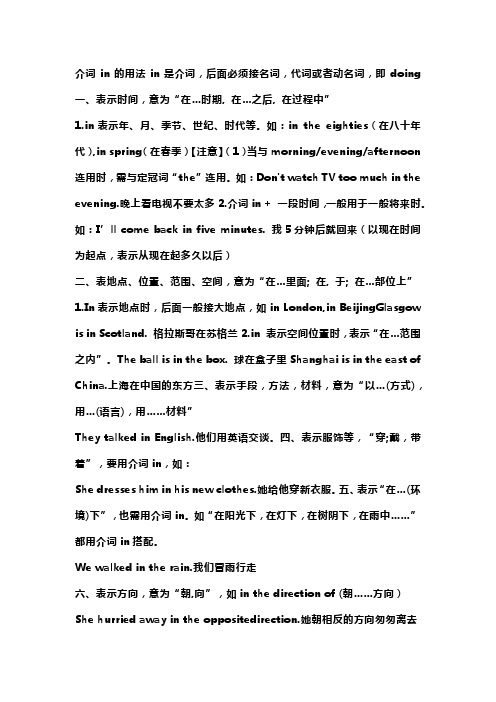
介词in的用法in是介词,后面必须接名词,代词或者动名词,即doing一、表示时间,意为“在…时期, 在…之后, 在过程中”1.in表示年、月、季节、世纪、时代等。
如:in the eighties(在八十年代),in spring(在春季)【注意】(1)当与morning/evening/afternoon 连用时,需与定冠词“the”连用。
如:Don't watch TV too much in the evening.晚上看电视不要太多2.介词in + 一段时间,一般用于一般将来时。
如:I’ll come back in five minutes. 我5分钟后就回来(以现在时间为起点,表示从现在起多久以后)二、表地点、位置、范围、空间,意为“在…里面; 在, 于; 在…部位上”1.In表示地点时,后面一般接大地点,如in London,in BeijingGlasgow is in Scotland. 格拉斯哥在苏格兰2.in 表示空间位置时,表示“在…范围之内”。
The ball is in the box. 球在盒子里Shanghai is in the east of China.上海在中国的东方三、表示手段,方法,材料,意为“以…(方式),用…(语言),用……材料”They talked in English.他们用英语交谈。
四、表示服饰等,“穿;戴,带着”,要用介词in,如:She dresses him in his new clothes.她给他穿新衣服。
五、表示“在…(环境)下”,也需用介词in。
如“在阳光下,在灯下,在树阴下,在雨中……”都用介词in搭配。
We walked in the rain.我们冒雨行走六、表示方向,意为“朝,向”,如in the direction of (朝……方向)She hurried away in the oppositedirection.她朝相反的方向匆匆离去七、表示数量、程度、比例,意为“按,以;在...中”,如in large numbers(数量极大的)One child in twenty has this disease.二十个小孩中有一个患有这种疾病。
- 1、下载文档前请自行甄别文档内容的完整性,平台不提供额外的编辑、内容补充、找答案等附加服务。
- 2、"仅部分预览"的文档,不可在线预览部分如存在完整性等问题,可反馈申请退款(可完整预览的文档不适用该条件!)。
- 3、如文档侵犯您的权益,请联系客服反馈,我们会尽快为您处理(人工客服工作时间:9:00-18:30)。
at 时间最短,一般表示点时间,具
体的某个时刻
1.at six o’clock 2.at 8:30
习惯用语:at night at noon
On ‘在具体某一天’ 包括 ‘具体某一天的上午 下午 和晚上’
1.On Mother’s Day ,I give carnations to my mother. 2.On Monday/Friday/Saturday…… 3.On Tuesday afternoon
On Sunday morning (evening) 4.On July 1,1999
On March 7 <1>On + 星期(1----7) <2>On + 年,月,日 / 年,日 / 月,日
In 时间范围大(一段时间)
1.in spring/ summer/ autumn/ winter 2.in May 3.in the morning /afternoon/ evening 4.in September/ May/ June/ July 5.in a year in a week 1 > in +四季 2 > in +月份 3 in +年 / 年,月 / 月
At 几点钟;In 一段时间;On 某一天
1. I go to school __a_t__ seven o’clock. 2. I usually play badminton ___o_n__ Sunday afternoon. 3. The building’s shadow is long ___in___ the afternoon. 4. The sun is high in the sky __a_t__ noon. 5. We have lunch __a_t__ 11:35 at school every day. 6. __O__n__ Monday, I have six classes. 7. My birthday is __o_n__ the first of May. 8. ___In___ autumn, we can eat much fruit. 9. Summer comes ___in___ June, July and August. 10.__O_n___ Childom.
